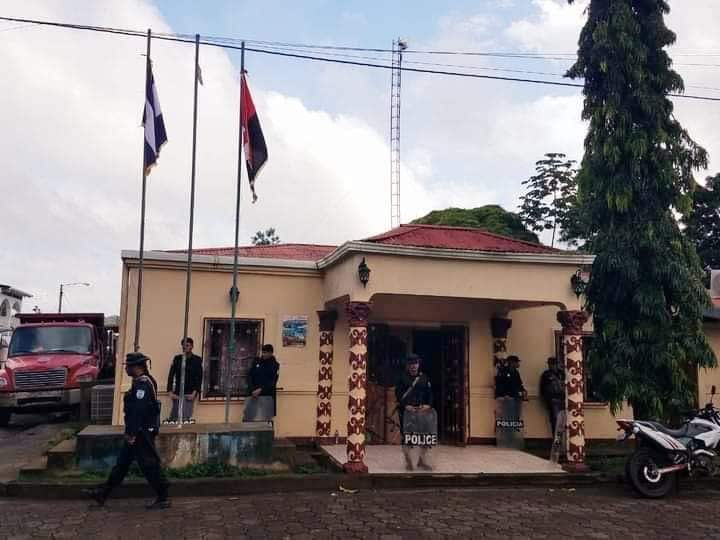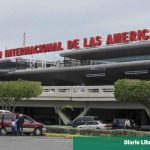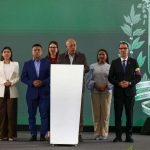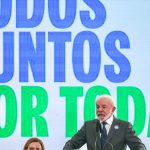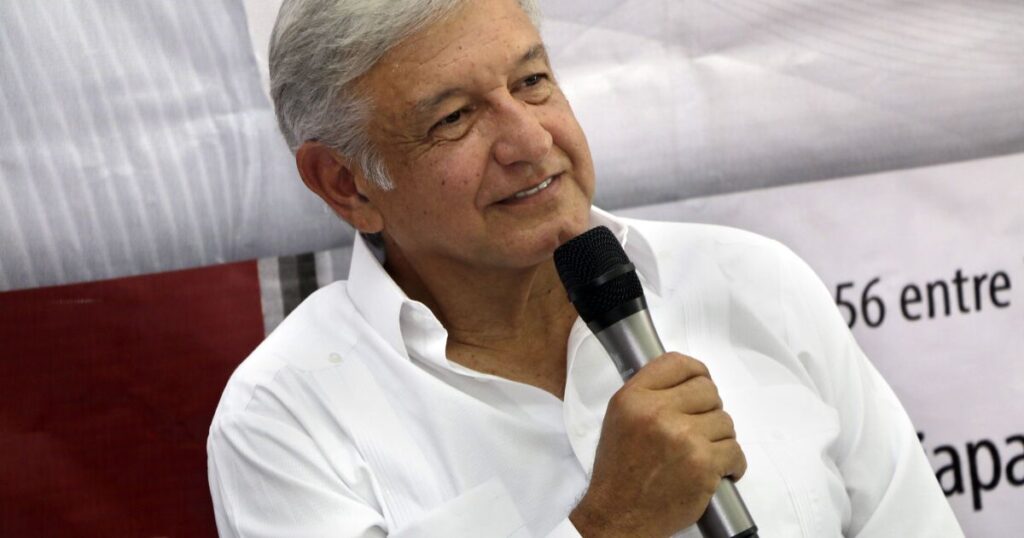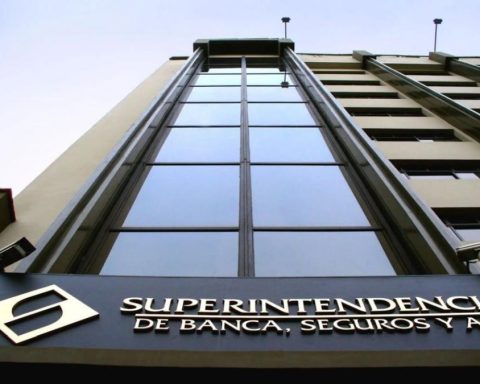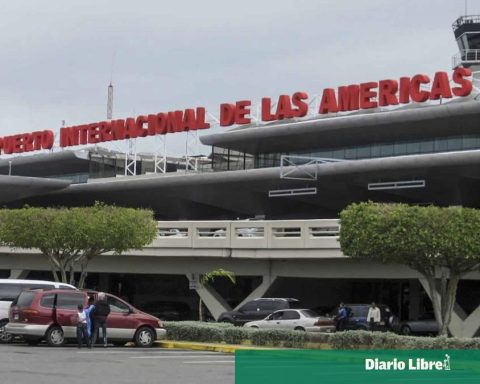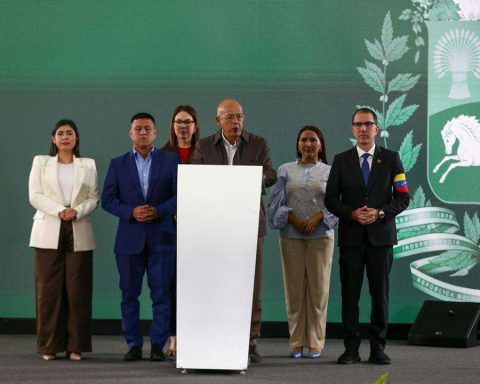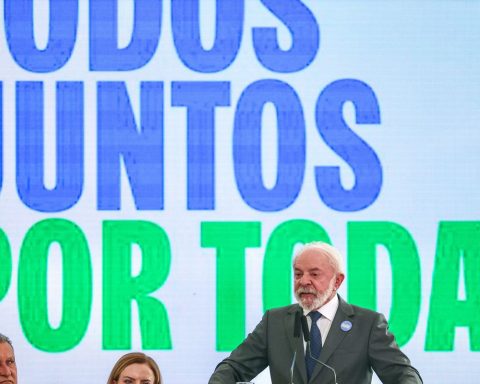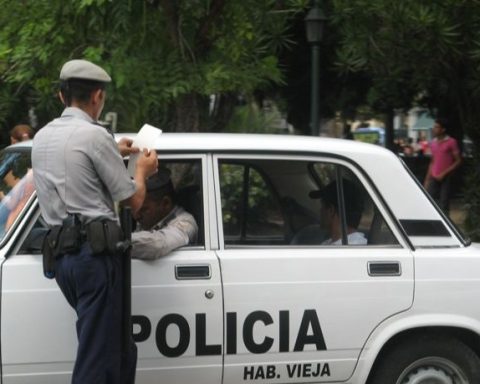Paralyzed by fear and uncertainty caused by seeing dozens of police officers on the site, a witness to the seizure of the Cuá Mayor’s Office, municipality of Jinotega, was able to observe how unknown persons raised a flag of the ruling party in the opposition commune. It was eight o’clock in the morning on July 4, and the regime of Daniel Ortega and Rosario Murillo subsequently communicated to municipal workers that Mayor Isidro Irías and his team would be replaced by Sandinista councilors.
The Nicaraguan Institute for Municipal Development (Inifom), the executive’s supervisory body, appointed FSLN councilor Douglas González as mayor, Yadira Gurdián as deputy mayor, and Gloria Rivera has since served as the new secretary of the Municipal Council.
The large police presence was notorious in the town. The operation began at five in the morning, when dozens of anti-riot officers surrounded the place, sowing anxiety among the inhabitants of this community located in the north of the country. “Practically everything was militarized, they use weapons to disrespect the popular will,” said a community source.
“At the meeting they told us that we had to understand that it was an order from above and that the Mayor’s Office could not remain in the hands of a mayor of Citizens for Freedom (CxL), because, since last year, that party had no legal status. ”, he added.
The measure against the opposition mayors was immediately rejected by the leadership of the party to which they belonged, headed by Kitty Monterrey, exiled since 2021 after the decision to remove their status. This happened before the general votes in which Ortega was re-elected without political competition, after the repressive escalation through which he imprisoned more than 60 people, including political, economic and social leaders.
The appropriation of the liberal mayors is questioned by the sociologist and municipalist Silvio Prado, who days ago assured that it was a “confiscation of thousands of votes”.
For Prado, it is a definitive blow to municipal self-government. “Without political autonomy, there is no municipality to decide how the internal administration is organized or to manage services, and even less to plan local development,” Prado explained in a opinion piece, published in CONFIDENTIAL.
Five mayors dismissed in two days
On July 4, when Irías was removed, the Ortega dictatorship also expelled Mayor Noel Moreno, from San Sebastián de Yalí, also in Jinotega; Francisco Herrera, from Murra, in Nueva Segovia, and Reynaldo Galeano, from El Almendro, in Río San Juan.
He used the same method: police everywhere and meetings with local employees to communicate the decision.
The first mayor usurped by the regime in this assault was Óscar Gadea, from Santa María de Pantasma, in Jinotega, who was deposed on July 2 in retaliation for a interview assigned to CONFIDENTIAL Y This week.
In that conversation, Gadea warned about the lack of conditions to elect new authorities next November, when municipal votes are scheduled throughout the country, which have not yet been called.
“The healthiest thing is that no party would lend itself to this (voting). That all the parties said here we do not have the conditions to go to elections because of everything that has been violated in the electoral law”, he opined.
The state decision did not come as a surprise to the mayors of CxL either. In August 2021, the president of Inifom, Giomar Irías, had warned them that “now they had no party.”
The assault by the FSLN and the Executive was also denounced by the organization Open Polls, which agrees that they are punitive actions against areas where the anti-Sandinista vote predominates, in addition to a violation of the popular will and the right to elect and be elected. .
According to the witness of the removal of Mayor Irías, in El Cuá, the dismissal was “an act of cowardice. They would have let the municipal period finish (to the authorities), the truth is that they looked bad both before the democratic people and those who are not. There are many Sandinistas who do not agree”, he expressed.
The total control of the FSLN in municipal power
With the mayor’s offices usurped by orders of the dictatorship, the FSLN now controls 141 of 153 municipalities, that is, more than 90% of those existing throughout Nicaragua.
To achieve this, the FSLN has used electoral fraud denounced since 2008 by the opposition and the instrumentalization of institutions such as the Judiciary, as evidenced in the actions against the mayors.
The immediate effect in these communities now seems to be the silence of the protagonists. CONFIDENTIAL tried to locate them, but it was impossible. Mayor Isidro Irías has his cell phone disconnected and workers from the Mayor’s Office confirmed that he has been unreachable for them since July 4.
An attempt was also made to talk about the issue with the deputy mayor of El Cuá, Oneyda Rodríguez Mairena, but she did not respond to calls either.
An attempt was made to locate the other mayors affected by Ortega’s measure. Only Reynaldo Galeano, from the community of El Almendro, expressed that he would not comment on the matter. “For now I am not going to give interviews, for security reasons,” he argued.
Mayor Oscar Gadea, of Pantasma, he claimed on Sunday, July 3, that “if they (the State authorities) have notified us that we had to hand over (the Mayor’s Office), we would have peacefully handed over. There was no need for riot gear.”
Mayor Francisco Herrera, from Murra, assured, for his part at the time, that he did not even leave his house on the day of his dismissal. In his case, it was 50 police officers who arrived at his home at five in the morning to inform him of the decision that he should hand over the municipal power.
“I did not leave my house to the Mayor’s Office, but I learned that they surrounded the building, entered and waited for the arrival of the staff, who enters at eight in the morning, so that they would deliver everything to them,” he said.
Former mayor of Wiwilí condemns attack on local power
From the United States, where she is in exile, the mayor of Wiwilí, Reyna Hernández, whose municipality was taken over in October 2020 by FSLN councilors, rejected the new dismissals.
For her, the underlying issue is disrespect for the population of their municipalities. “They do not respect the vote of the people, that is why elections are held! If not, why do them? It is assumed that if they vote it is because the people elect the authorities and those five years (of municipal term) must be respected,” said Hernández, who was elected in the seat of the Liberal Constitutionalist Party (PLC), which controls ten other mayors in the country.
The mayor recalled that in her case there was a pattern of violence from the very day of her electoral victory in 2017, when they attacked her party’s campaign house. In the first years of her management, three of her closest collaborators were also assassinated.
In 2018, when the municipality took office, the outgoing FSLN authorities did not want to hand over power to him. Hernández added that they did not even give him the band, they left the offices empty, taking all the computers and leaving him a debt of two million córdobas.
They also had to face the budget cut that the Executive makes to the opposition municipalities to leave them without resources through municipal transfers. She remembers that, in the first of them, the two million of her predecessor’s debt were collected and thus “throw the people on top of us.”
“Since the campaign they said that they would not let us govern. They only left me three years,” recalls this former official, a merchant by profession.
The end of his administration came after a demand for 16.5 million córdobas, filed by 36 former employees of the Mayor’s Office. They were based on a collective agreement, left by the previous administration, which served to process it.
Hernández accepted before the digital media Despacho 505 that what really corresponded to these former employees was two million córdobas, but the figure was imposed by the Ministry of Labor and the Courts.
For that accusation, Hernández went to the courts, they issued an arrest warrant and he hid for a month. She finally came forward and was only barred from holding public office for two years. What came later was a process of substitution of the authorities and she did not assume the vice mayor as it should have been, according to the law.
The Police also entered the municipality, destroying the gates. Hernández affirms that, despite being inhibited and not being in the building, they kept her under surveillance in the town. She then grabbed her belongings and left the country through Honduras, to protect herself from her. “We mayors have been beaten,” she adds from exile.
Former mayor of Mulukukú regrets “excessive ambition”
The former mayor of Mulukukú, Apolonio Fargas Gómez, who resigned from his position in 2019 and went into exile after being persecuted by the State to protect his security, lamented the ambition of the dictatorship to achieve greater control of all localities.
The chase now reminded him of his own odyssey. Fargas was prosecuted by the regime in the context of the 2018 opposition protests, brutally repressed by the State. He was jailed for 11 months.
In a press release, the Police accused him of being “the leader of a terrorist group”, which they accuse of being responsible for the murder of four officers in the Pueblo Nuevo region of his municipality, on June 11, 2018, during the outbreak that year against the Ortega regime.
Fargas maintains that the justice system prosecuted him for not thinking like the dictatorship and acknowledges that he left because of an “amnesty” law that was applied to crimes that I never committed.
Currently, Fargas earns his living in a packaging company in the United States, from where he laments the situation in the country. “It is not easy to leave my country, one thinks of returning to his beloved Nicaragua,” he says.
The former mayor expresses that this type of action by the Ortega-Murillo regime seeks to sow anxiety in the population to prevent citizens from being encouraged to participate in electoral processes. He also considers that Ortega seeks to enthrone himself in power for a longer time.
Fargas’ last day in office was August 9, 2019. On the 16th he left the country. The mayor’s offices taken over by Inifom, he assures, have a historical past of fighting against Sandinismo, active since the eighties.
